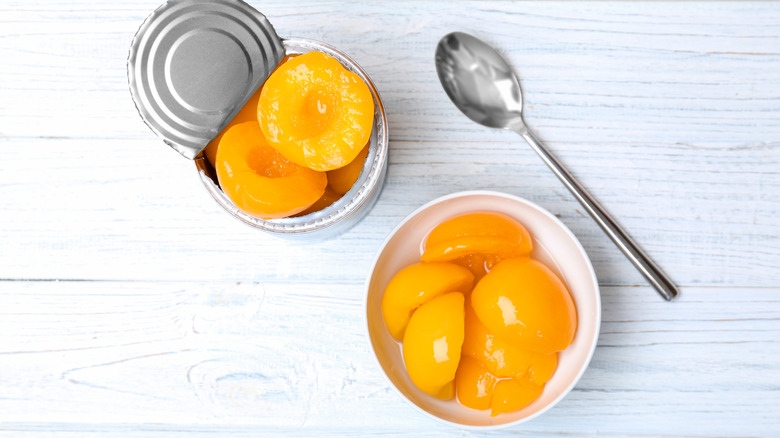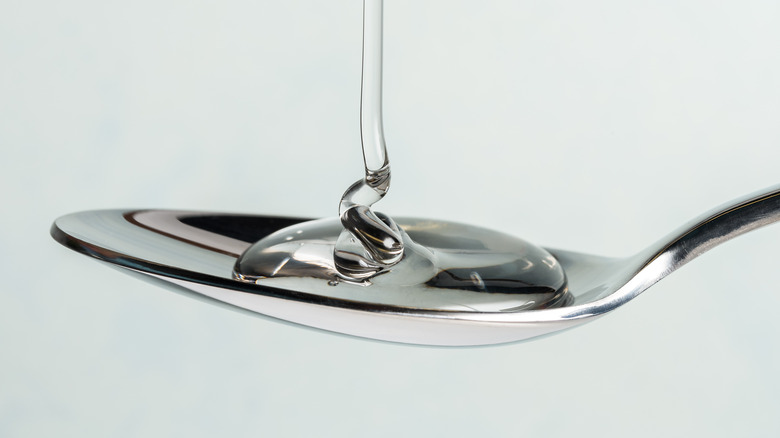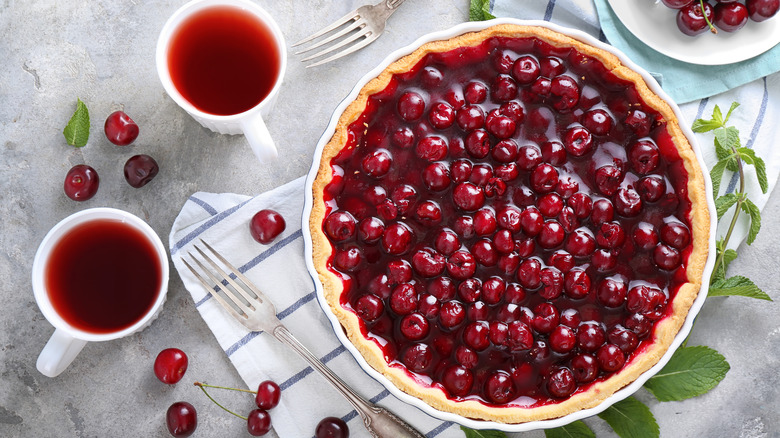The Sweet Ingredient That Differentiates Light And Heavy Syrup In Canned Fruit
Canned fruit is a convenient way to enjoy a variety of sweet, juicy fruit anytime of year without the hassle of peeling and chopping. It's especially useful when you're baking a pineapple upside-down cake or tossing canned mandarin oranges atop a salad dressed with raspberry vinaigrette. But while using canned fruit comes with relative ease, a walk down the canned foods aisle of the grocery store can be overwhelming. In addition to a variety of cuts, slices, and fruit chunks, along with the question of which canned fruits to buy and which ones to avoid, there's also the factor of syrup.
There are a variety of syrup types when it comes to canned fruit, including light and heavy syrup (not to mention fruit canned in fruit juice concentrate or water). Though the canning process is ultimately what preserves the fruit, syrup helps maintain the fruit's quality, particularly by keeping it sweet and holding its shape.
When faced with the choice of whether to buy canned fruit in light or heavy syrup, it's important to know the differentiating ingredient that makes heavy syrup extra viscous and unique: corn syrup. While light syrup consists of just water and sugar, heavy syrup is made up of water, corn syrup, and sugar.
Corn syrup helps keep canned fruit moist and glossy
Corn syrup is a thick, liquid sweetener made from cornstarch, water, and acid. Compared to granulated sugar, which scientifically is a disaccharide made up of sucrose and glucose, corn syrup consists of just glucose, a simple sugar that's more readily broken down by the body. The thick, gooey sweetener has a consistency similar to pourable honey and is commonly used as a thickening agent in cooking and baking. It's the key to adding moisture and a smooth texture to an array of candies, confections, and cake batters, and also helps in preventing sugar crystallization when making sweets, such as caramel sauce.
Compared to light syrups, canned fruit in heavy syrup, containing corn syrup, will have a signature glossy sheen and an extra-juicy texture. The fruit will also carry some of the syrup, which coats it when removed from the can.
Compared to canned fruit in light syrup, which is a significantly thinner sugary liquid, heavy syrup imparts a decadent, thick, and somewhat intensely sweet nature to the fruit.
How to choose canned fruit
When the moment comes to select a canned fruit, you can confidently choose light vs. heavy syrup based on your cooking or baking application. Canned fruit in heavy syrup is ideal for incorporating into pies, cakes, or fruit toppings where the extra syrupy liquid adds to the flavor and texture of the dish. When making cherry pie, use canned cherries in heavy syrup to skip the pitting step that comes along with using fresh cherries. Canned fruit in heavy syrups also can provide additional juiciness when throwing together luxuriously refreshing breakfast treats, such as classic Bisquick peach cobbler.
Alternatively, canned fruit stored in light syrup is an ideal choice for adding fruit to desserts in which you don't want to add a ton of extra sugar and viscous liquid. For instance, when adding sliced pineapple between layers of carrot cake and sweet cream cheese frosting, using pineapple in light syrup will allow for delicate fruit bites that will compliment (not distract) from the other flavors of the cake.
Light syrup is also a good choice for adding canned fruit to more savory dishes and as toppings for salads, as well as if you're avoiding extra added sugar.


